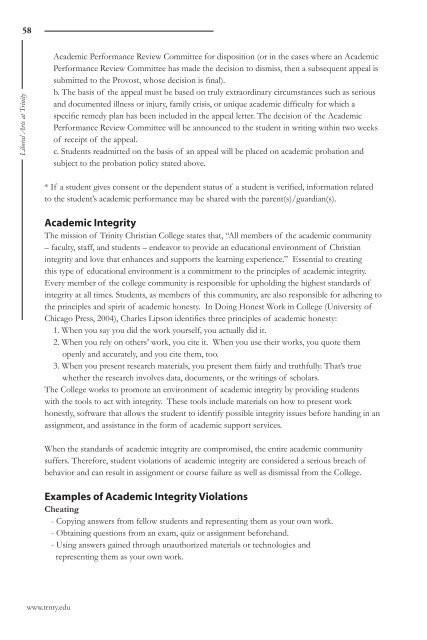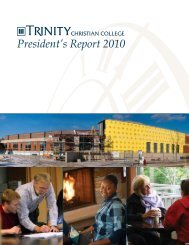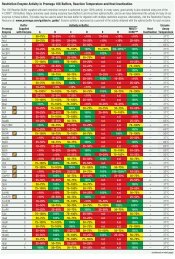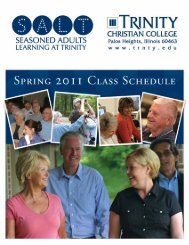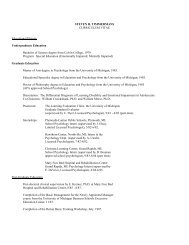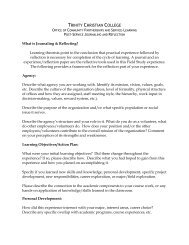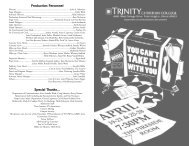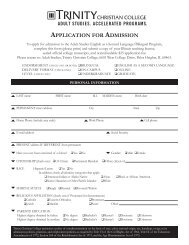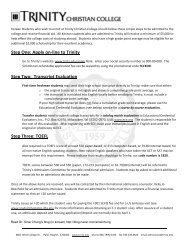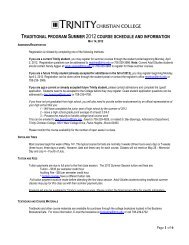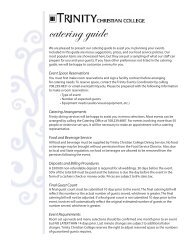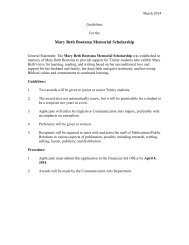College's catalog - Trinity Christian College
College's catalog - Trinity Christian College
College's catalog - Trinity Christian College
You also want an ePaper? Increase the reach of your titles
YUMPU automatically turns print PDFs into web optimized ePapers that Google loves.
58<br />
Liberal Arts at <strong>Trinity</strong><br />
Academic Performance Review Committee for disposition (or in the cases where an Academic<br />
Performance Review Committee has made the decision to dismiss, then a subsequent appeal is<br />
submitted to the Provost, whose decision is final).<br />
b. The basis of the appeal must be based on truly extraordinary circumstances such as serious<br />
and documented illness or injury, family crisis, or unique academic difficulty for which a<br />
specific remedy plan has been included in the appeal letter. The decision of the Academic<br />
Performance Review Committee will be announced to the student in writing within two weeks<br />
of receipt of the appeal.<br />
c. Students readmitted on the basis of an appeal will be placed on academic probation and<br />
subject to the probation policy stated above.<br />
* If a student gives consent or the dependent status of a student is verified, information related<br />
to the student’s academic performance may be shared with the parent(s)/guardian(s).<br />
Academic Integrity<br />
The mission of <strong>Trinity</strong> <strong>Christian</strong> <strong>College</strong> states that, “All members of the academic community<br />
– faculty, staff, and students – endeavor to provide an educational environment of <strong>Christian</strong><br />
integrity and love that enhances and supports the learning experience.” Essential to creating<br />
this type of educational environment is a commitment to the principles of academic integrity.<br />
Every member of the college community is responsible for upholding the highest standards of<br />
integrity at all times. Students, as members of this community, are also responsible for adhering to<br />
the principles and spirit of academic honesty. In Doing Honest Work in <strong>College</strong> (University of<br />
Chicago Press, 2004), Charles Lipson identifies three principles of academic honesty:<br />
1. When you say you did the work yourself, you actually did it.<br />
2. When you rely on others’ work, you cite it. When you use their works, you quote them<br />
openly and accurately, and you cite them, too.<br />
3. When you present research materials, you present them fairly and truthfully. That’s true<br />
whether the research involves data, documents, or the writings of scholars.<br />
The <strong>College</strong> works to promote an environment of academic integrity by providing students<br />
with the tools to act with integrity. These tools include materials on how to present work<br />
honestly, software that allows the student to identify possible integrity issues before handing in an<br />
assignment, and assistance in the form of academic support services.<br />
When the standards of academic integrity are compromised, the entire academic community<br />
suffers. Therefore, student violations of academic integrity are considered a serious breach of<br />
behavior and can result in assignment or course failure as well as dismissal from the <strong>College</strong>.<br />
Examples of Academic Integrity Violations<br />
Cheating<br />
- Copying answers from fellow students and representing them as your own work.<br />
- Obtaining questions from an exam, quiz or assignment beforehand.<br />
- Using answers gained through unauthorized materials or technologies and<br />
representing them as your own work.<br />
www.trnty.edu


